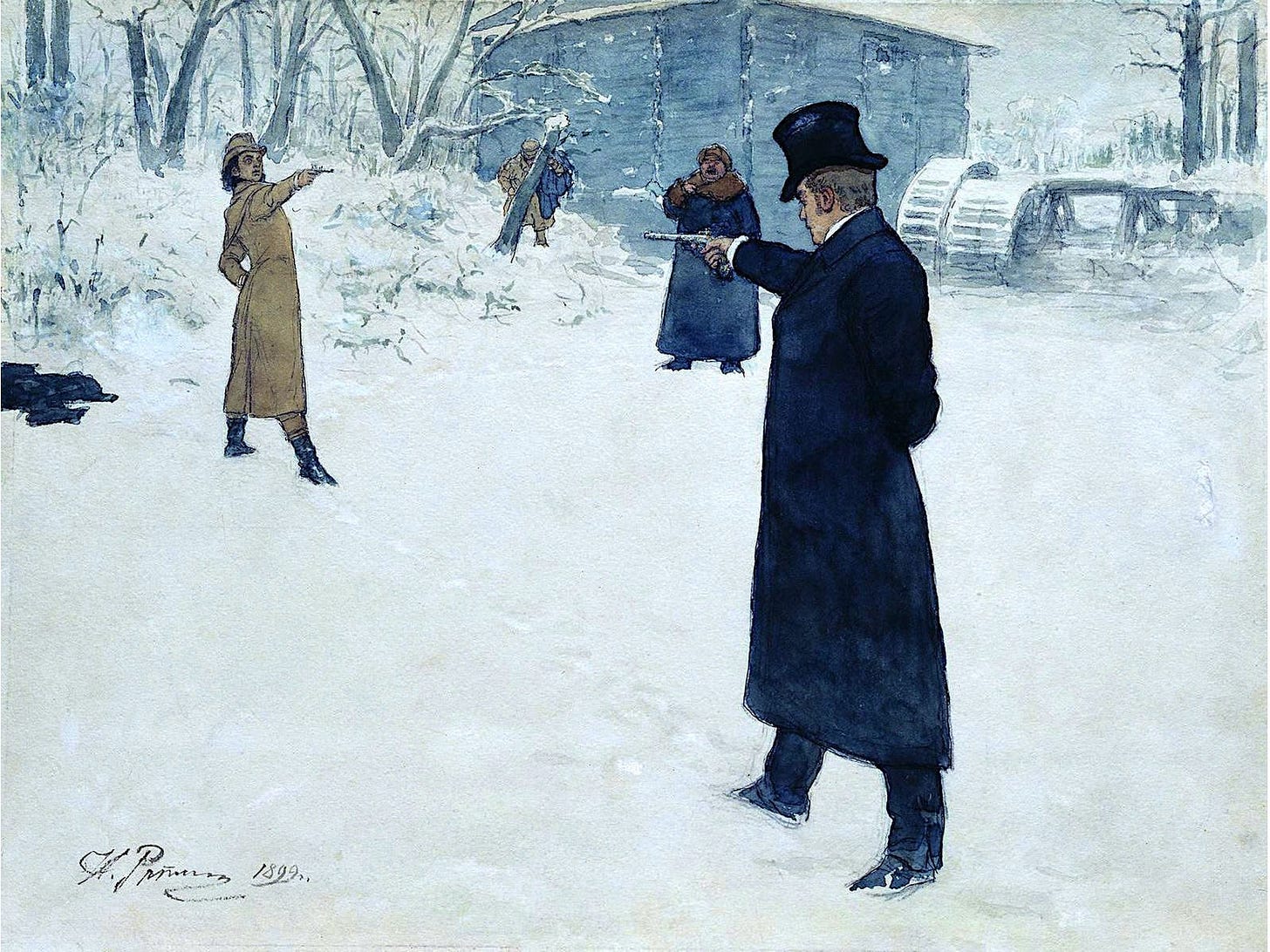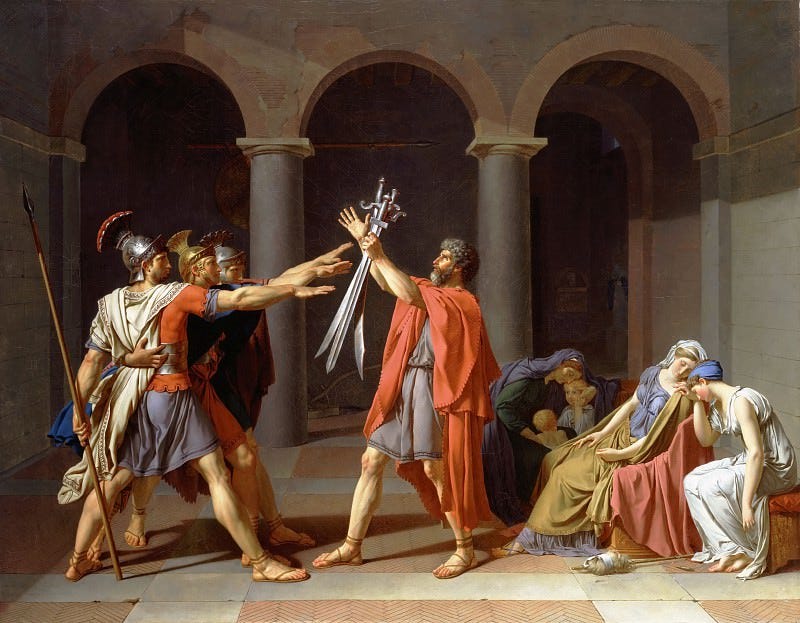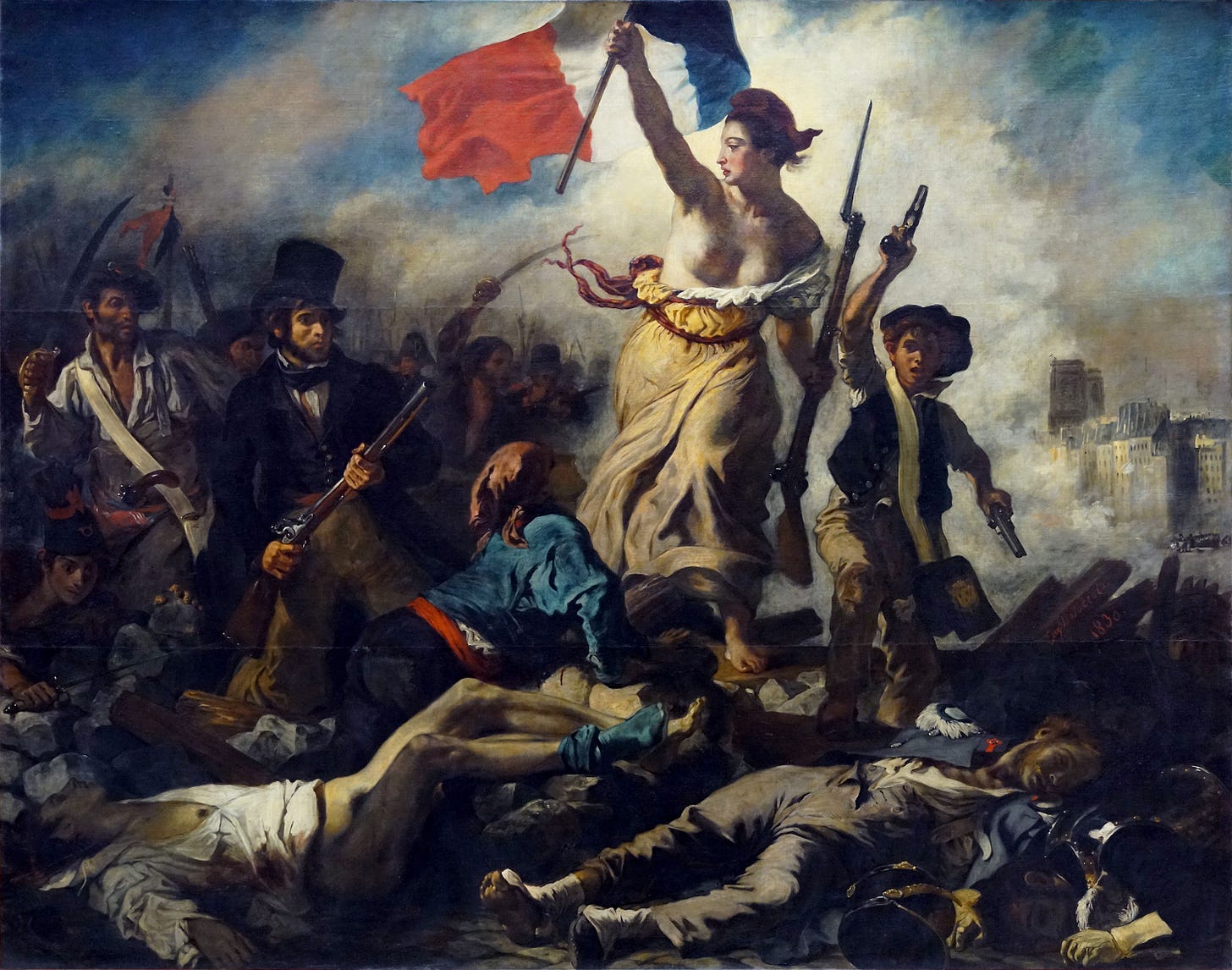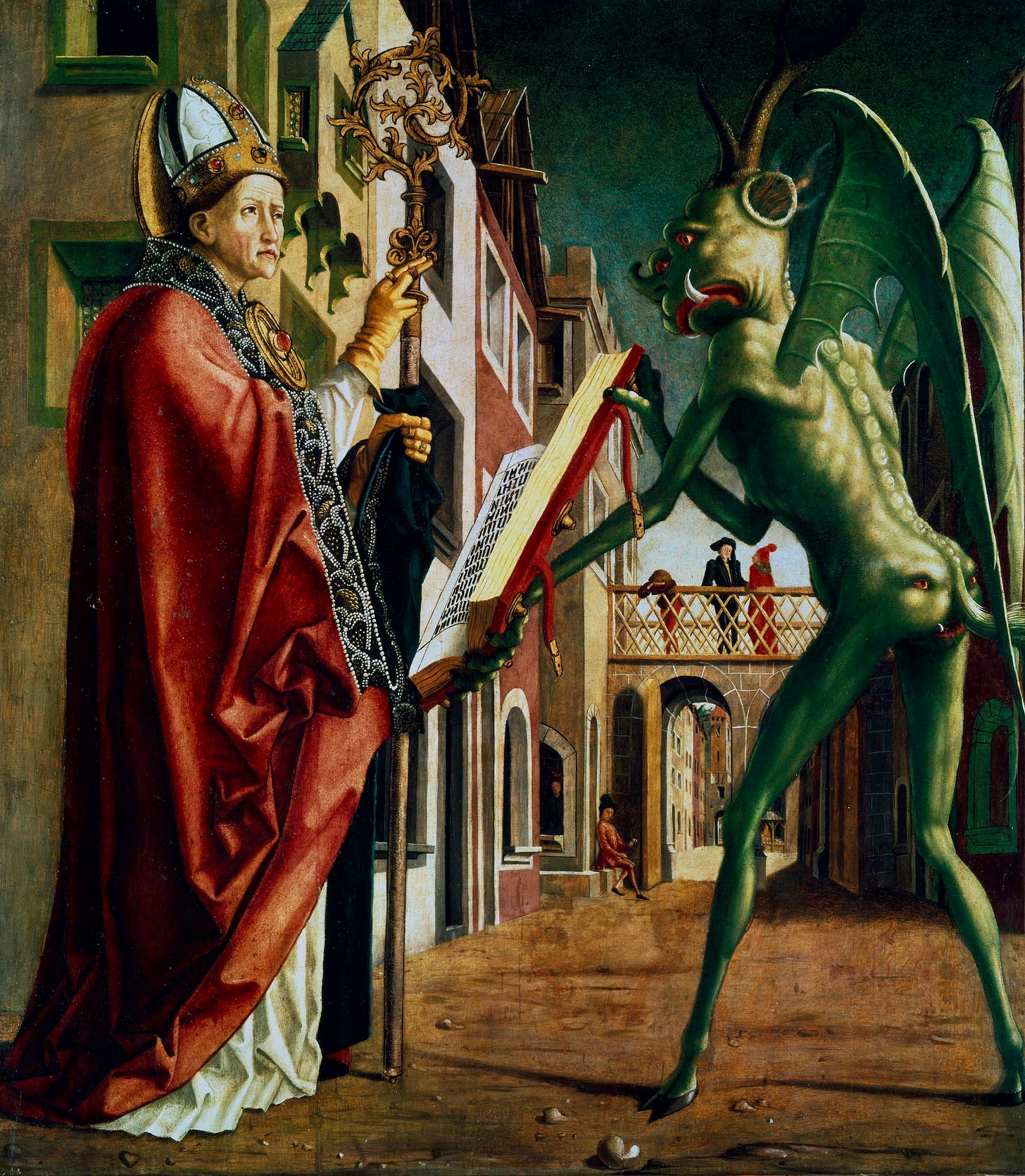The Friend–Enemy Distinction on the Political Right and on the Political Left
Why the Right begins with the fallen nature of man and loyalty to particularistic bonds, while the Left tends toward universalism and abstract moral claims—and why that creates a fundamental conflict
I had a very interesting exchange with a leftist the other day, and it got me thinking about why we couldn’t comprehend each other. Then I decided to write an article about it so I could pry a bit deeper into why there’s such a fundamental disconnect between the Right and the Left. I also wished to see if I could properly explain and articulate these ideas in the format of an essay in the process. But ultimately, my goal here is to try to grasp why that leftist and I just couldn't understand each other.
After all, we were both speaking fluent and comprehensible English, and yet the poor man couldn't quite understand why I—or other right-wingers—believe that having loyalty to one’s in-group is a good thing.
In fact, according to him, it even sounded “psychopathic”! That was due to my apparent inability or unwillingness to care about what was happening in a country across the sea, somewhere in the dark continent of Africa—something entirely outside of my control and outside the primary sphere of concern for me, an individual of European descent living in a South American country. So I asked him:
“What do I have in common with Africans to the point where it should fall to me—and really, to everyone else in my country—to give ourselves and our resources in unmitigated aid to those people? What exactly is the moral obligation of me and my fellow countrymen to them?”
He answered with the most absurd of platitudes:
“Don’t you share your humanity with them?”
Completely astounded, I told him that technically, I share humanity with every single human being on Earth. As such, that metric is wholly inadequate to measure worth or to determine my obligations to them—especially compared to someone from my family, or a friend, or even a neighbor from my city or municipality. What about someone who shares my race, my culture, or my language? Or a fellow citizen from my state? Or someone from the same country? And what about those who share my religion? Aren’t all of these people also human? And don’t I have far stronger obligations to them than to a complete stranger I’ve never met, will never meet, and whose faith, culture, and language I don’t know—and who lives on another continent?
This interaction made me realize something essential—something I had understood intuitively but never quite put into words:
Right-wing and Left-wing worldviews are not simply different political stances. They are completely distinct moral and metaphysical paradigms.
It’s not that the Leftist is "wrong" in the way one might be mistaken in math or geography. It's that he is operating on a completely different set of values, definitions, and goals. He hears “loyalty to my people,” and he interprets it as “hatred of others.” He hears “tradition,” and he imagines oppression. He hears “inequality,” and he thinks injustice. He cannot comprehend a worldview in which hierarchy is natural, tradition is sacred, or loyalty is morally prior to abstract universalism.
This chasm is so profound that even words lose shared meaning. Words like “justice,” “freedom,” “community,” and “duty” are defined so differently by the two sides that dialogue becomes a sort of pantomime—each side speaking past the other, increasingly frustrated that the other doesn't “get it.”
This is why so many political debates are sterile and circular. They're not disagreements within a common framework; they're battles between incompatible worldviews. And while both Left and Right have their own assumptions, it's the Right that begins with the Friend–Enemy Distinction, as Carl Schmitt would put it—not as a choice, but as a recognition of political reality.
The Right understands that we are tribal creatures, that loyalty begins with those closest to us, and that man is a fallen being—not a blank slate waiting to be perfected by idealistic policy. This view, while less utopian, is far more grounded.
The Left, on the other hand, believes in universal brotherhood, the perfectibility of man, and the supremacy of reason over tradition. But this very belief in universalism becomes a source of moral blindness, because it flattens the world—stripping people of their particular identities in favor of some imagined universal “humanity” that no one has ever actually encountered in real life.
What is lost in this universalism is love—real love, not sentimentality. For love requires boundaries. One cannot love everyone equally, and attempts to do so cheapen the very meaning of love.
The Right-Winger’s Primary Concern Is the Local:
As mentioned earlier, the Right-winger is inherently localist in his primary concerns. He cares most about what is close to him—what he can see, touch, influence, and protect. His politics begin not with abstractions, but with lived experience: his family, his community, his people, his traditions. He shapes his moral compass around what benefits and defends those bonds.
Because of this, Right-wingers across different cultures or tribes often find themselves at odds. They share a common understanding of the ordering of values—family over state, religion over ideology, virtue over comfort—but they may disagree on which in-group should be prioritized. This explains the endless debates between, for example, Christian fundamentalists and neo-pagan traditionalists, or between ethnonationalists and civic nationalists.
And yet, despite such infighting, the Right remains more coherent than it appears. The unity of the Right lies in its hierarchy of values and its acceptance of human inequality, in-group preference, and the enduring role of religion and custom in shaping society. Right-wingers understand that the world is not a level playing field, and they are not interested in making it one. Rather, they seek to preserve what is worth preserving—and to build upon that which has already proven itself to be good.
This conservatism is not merely political. It is metaphysical.
The Right-winger often believes the world is fallen, or at least harsh. But rather than despair, he responds with reverence: for family, for tradition, for divine order. He sees no value in utopian schemes. He knows that every attempt to forcibly create heaven on Earth has ended in blood and ashes. He prefers instead to live in accordance with natural and moral truths—even if they are uncomfortable, even if they come with suffering.
He cares for the environment, not out of ideological compulsion, but because it forms the backdrop to his home and his heritage. He does not worship “nature,” but he respects the order of things. He sees himself as a steward, not an owner.
The Right-Wing Soul and the Timeless Man:
The man of the Right often believes in heroism. He believes in an objective standard of right and wrong—or, at the very least, in a hierarchy of virtues that transcend mere opinion. He may accept moral ambiguity as a reality of life, but he never denies the existence of good and evil. Even in wrestling with complexity, he still affirms that some things are better than others, and that some paths lead to nobility while others lead to ruin.
He believes in the noble, the beautiful, the honorable, the dutiful—things that do not change with fashion or whim. He does not need to theorize them into existence; he feels them in his blood. They are natural to him. He does not have to be taught to protect his family or revere his ancestors. It flows from his soul.
Men like this have existed across time and civilization. In fact, one could say that the default setting of most human societies has been “Right-wing” in the traditional sense: religious, familial, patriotic, in-group-oriented, and yes, often collectivist—but collectivist within the bounds of shared blood, shared belief, and shared land.
Such societies were structured around the divine order, warrior codes, rites of passage, duties to kin, and reverence for the dead. These were not oppressive systems, but civilizational compasses. In them, a man knew who he was, and what he owed to those around him.
If we were to define the political Right and Left in terms of physics, we might say the Right corresponds to enthalpy—the force of building, preserving, creating, and ordering. The Left, by contrast, corresponds to entropy—the force of disintegration, abstraction, deconstruction, and dissolution.
The Right acts in the name of higher values—religious or quasi-religious—and always with reference to his in-group’s identity and survival. Whether those values come from revelation or ancestral wisdom, they are treated as real, not as personal tastes.
The Right-winger does not need the world to be perfect to act morally. He does not need everyone to agree with him. He does not crave the applause of strangers. He only needs to be aligned with what he knows to be true, to live out the duties that are his by birth, and to serve what he loves—be it his family, his God, his nation, or his community.
The Left-Wing Type and the Modernist Delusion:
Now contrast this with the Leftist: he is the inverse of the Right-wing man in almost every regard.
The Leftist often identifies with the outgroup of his own society. He conceptualizes himself as a landless, deracinated individual—untethered by heritage, loyalty, or place. He is either apathetic toward or openly hostile to his people’s history, customs, and faith. He holds little regard for the symbols and institutions his ancestors built. He lacks religious faith, often deriding it as superstition or oppression, and he frequently harbors a strained or broken relationship with his family and community.
The few companions he does have tend to be co-conspirators in grievance, loneliness, and resentment. He is often aimless, but typically of slightly above-average intelligence—a dangerous combination that breeds arrogance and entitlement. Convinced that the world is unfair to him, he believes he is destined to be part of a movement that will finally “fix” it.
His ideological affinities gravitate toward atheism, rationalism, empiricism, and Marxism. He tends toward materialism and nihilism, often fearing death and seeking comfort above all else. He may rightly be described as Nietzsche’s Last Man: a creature who shirks challenge, avoids suffering, and believes that comfort equals freedom.
He often subscribes to a blank-slate view of human nature—seeing individuals as infinitely malleable, mere products of environment and social constructs. In this worldview, will, virtue, and even biology are secondary to narrative and power. Hence the bizarre and schizophrenic separation of “sex” from “gender,” both of which are redefined at whim as fluid or entirely artificial.
In his eyes, identity is mutable, reality negotiable, and morality subjective. What matters is not truth or duty, but power and liberation. His highest good is the elimination of suffering—not through nobility or transcendence, but through anesthetic indulgence. Pain is evil, comfort is good, and any restraint is repression.
Historically, this sort of personality appears only rarely—and almost never before the industrial era. There are exceptions, of course: one might cite Jan Matthias and John of Leiden, the radical Anabaptists who seized Münster in 1534. Their short-lived theocracy, marked by polygamy, millenarian fanaticism, and violent egalitarianism, prefigures much of modern Leftism: oikophobia, narcissism, utopian delusion, and totalitarian cruelty.
Yet only in the modern age—when technology began to shield man from the natural consequences of folly—could the Leftist type emerge as a mass phenomenon.
The Modern Left as an Agent of Entropy
It is not inappropriate to say that while antisocial and oikophobic traits existed long before modernity, the ideological and psychological Left—as a widespread political force—is a distinctly modern creation. It is less than 250 years old, emerging unmistakably during the French Revolution and finding its early avatars in figures like Rousseau and the bloodthirsty Marat.
It would not be a stretch to assert that the left-wing type is an agent of entropy, decay, and death within any society it inhabits. Nothing positive or enduring has come from the foundationally flawed principles of Leftist ideology. From the very inception of such poisoned concepts as “equality,” “democracy,” and “universal suffrage,” nothing good has ultimately been accomplished from the fruit of these trees—only rot and catastrophe.
Let us begin with the French Revolution as the prototype for these organized entropic movements. There we see the birth of many of modernity’s most destructive dogmas: the cult of reason, the deification of “the people,” the annihilation of tradition, and the institutionalization of envy. That dark fire has burned ever since, mutating into Anarchism, Communism, Socialism, Liberalism, Progressivism, and every other ideological attempt to enshrine atheocratic, anti-religious idol worship under the banners of “reason” and “progress.”
All of these ideologies have led—and continue to lead—to incalculable suffering, societal collapse, cultural obliteration, unjust wars, and meaningless deaths. Their toll remains uncontested in scale and scope by any other creed in human history. Even when such ideas appear benign at first, they inevitably metastasize into tyranny, bloodshed, and ruin.
With this in mind, one can begin to grasp the fundamental divergence at the heart of this essay: both Right and Left recognize the friend-enemy distinction as intrinsic to political life. But where the Right uses it in service of preservation, the Left uses it as a wrecking ball—seeking not to protect, but to dismantle.
The visions of the Right are constructive, rooted in loyalty, duty, and reverence. The visions of the Left are corrosive, driven by envy, abstraction, and destruction.
While the ideals of the Right arise intuitively—shaped by lived experience, affection, and a loyalty to what is known and loved—the ideals of the Left are almost entirely theoretical. They are cultivated not by life but by lifeless texts. The Leftist worldview is acquired through mediocre intellectualism and the rejection of objective reality. It is embraced by those willing to perform mental acrobatics, to kill and die for sentimental theories—only to be devoured by the very regimes they helped bring into being.
A Metaphysical Divide:
To recapitulate the central thesis and inevitable conflict presented in this essay:
The opposing visions of Left and Right are not merely rival political positions. They are different languages. When the Right speaks of honor, duty, and virtue, the Left hears repression, exclusion, and hierarchy. When the Left speaks of rights, liberation, and equality, the Right hears chaos, envy, and moral collapse.
Dialogue, then, becomes impossible. These are not complementary paradigms, but mutually exclusive metaphysical systems. One values the concrete; the other the abstract. One venerates the past; the other seeks its erasure. One grounds its morality in the lived experience of the particular; the other in an imagined, utopian universal.
It is therefore accurate to state that the leftist is, fundamentally, on a quest against reality itself, whereas the right-winger seeks to live in accordance with truth, virtue, and higher principles. This is not a simple clash of opinion—it is a war of worldviews. One rooted in reverence, the other in rebellion. One seeks to build, the other to level. One honors the sacred; the other profanes it.
This enmity is not the same as that found in rivalries between two equal and opposing philosophies. Rather, it is a spiritual and moral confrontation between that which is good, holy, virtuous, and true, and that which is evil, impious, degenerate, and false. It is a war waged—figuratively and literally—over the very soul and destiny of man.
So what will man choose?
Will he follow the path of virtue—seeking to uplift those around him, raising himself and others to higher standards, for the betterment of his family, the prosperity of his friends, the glory of his city, the strength of his nation, and the faith in his God? Will he embrace duty, rooted in love and loyalty, and strive to leave behind a world more beautiful, noble, and good?
Or will he embrace vice, surrendering to utopian delusions and cheap idealism that fracture the family, impoverish his friends, disgrace his community, weaken his nation, and propagate the lie of nihilistic relativism and atheism—to his own ruin and the degradation of all he once held dear?
This is the great dilemma of our age:
Beauty or ugliness?
Love or lust?
God or the devil?








Wow. The Right are really saints here on earth. Had no idea!
Great post.
I disagree with this, though:
“The Leftist worldview is acquired through mediocre intellectualism and the rejection of objective reality.”
That might be true of the current SJW, identitarian leftist. But this is a post 1960s, a Foucault influenced philosophy that was fairly obscure until social media. But the most massively destructive leftists weren’t “post modern,” they were Marxist-Leninist, which is a distinctly modernist based ideal. Meaning, they believe strictly in an objective , external reality to personal perception . Marx loved modernity, industry, and urbanism. What he loathed was the “pre modern” provincial , rural , religious worldview. ML was all about “scientific managerialism” of a centrally planned economy ruled by all powerful technocrats. This was probably the logical end game of modernity, and why the post modernists (ie, Foucault) hated Marxism, communism etc. they explicitly said so themselves . One could argue there are “post modern NEO marxists” who reject objectivity but retain and redefine Marxist class analysis as race/gender etc. but that’s not really the same as Marx’s original idea.